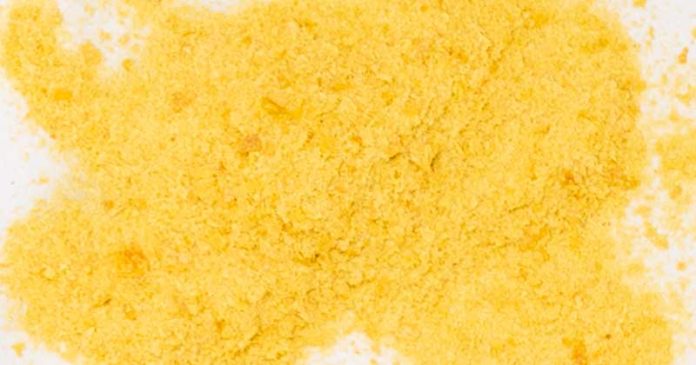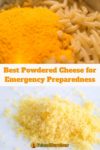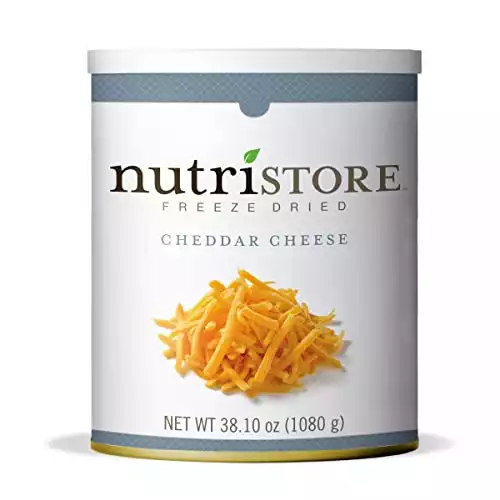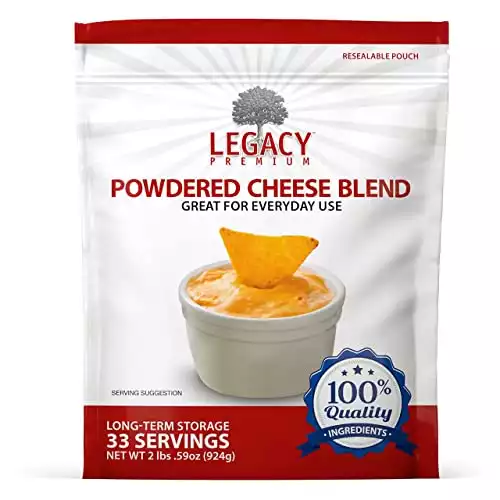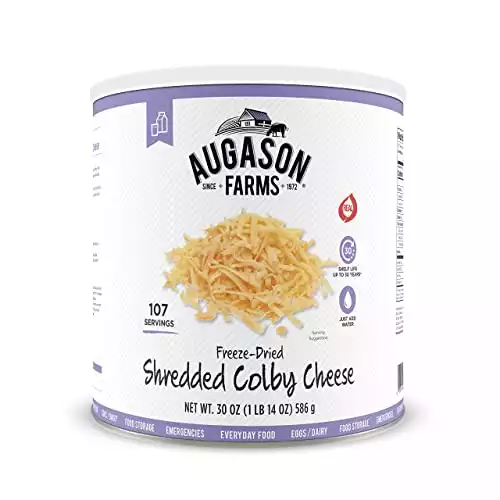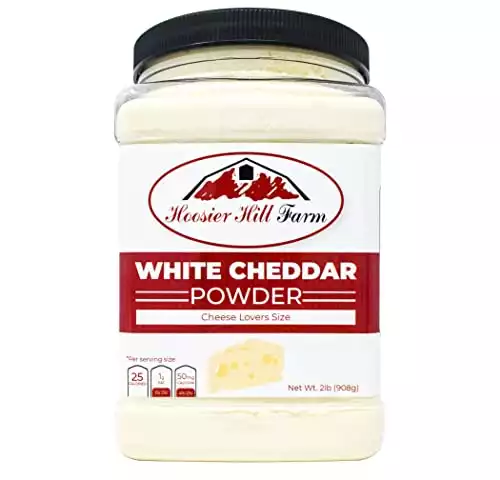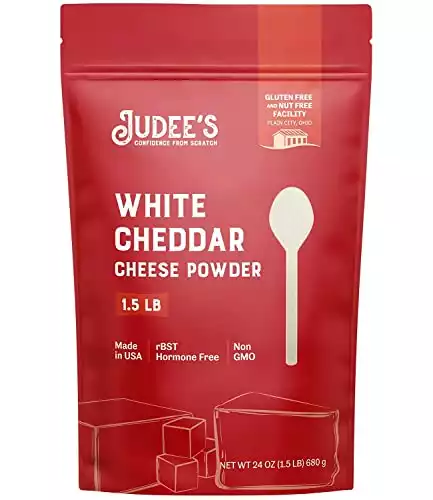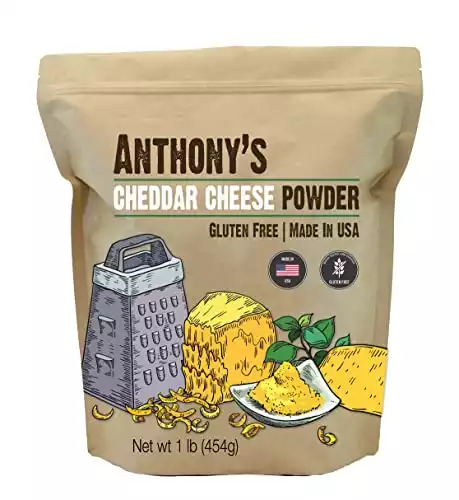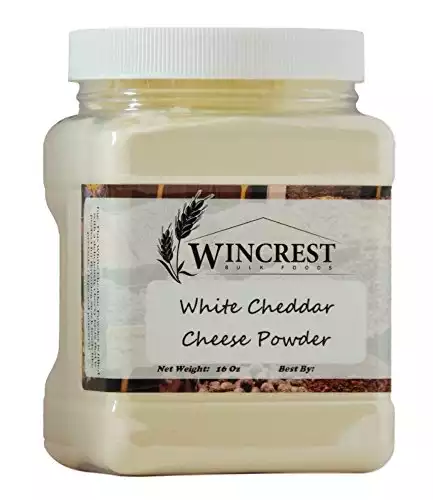Powdered cheese is a great food to have for emergency preparedness. It can make even the blandest foods (think plain rice or pasta) taste good.
But powdered cheese is one of the more expensive disaster foods to buy, and the cheaper options don’t last very long. On top of that, many powdered cheese products hardly contain any real cheese at all.
If you are confused about which powdered cheese to buy for long-term storage, here is what you need to know.
Best Powdered Cheese Options
These are the best powdered cheeses for prepping.
The top three have very long shelf lives.
The remaining powdered cheese products will need to be repackaged for long-term storage, or you’ll need to rotate through them within 1-2 years.
1. NutriStore Freeze-Dried Powdered Cheese
Verdict: Best Overall Powdered Cheese. It has a 25-year shelf life, is a good value for the amount you get, and is mostly real cheese.
Review:
NutriStore makes cheddar, mozzarella, and pepper jack powdered cheese. The brand gets our pick for best powdered cheese for a few reasons. First off, it is freeze-dried and packaged in #10 cans, which is why it has an impressive shelf life of 25 years.
Unlike many other brands of cheese powder, this one is made with real ingredients. The only additive is powdered cellulose, which helps prevent caking. The nutrition is good, and it has more calcium and protein than you’d find in brands with lots of fillers.
There are over 2 lbs of cheese powder per can, so while a single can isn’t cheap, it is a pretty good deal for the amount you get.
- Types: Cheddar, mozzarella, pepper jack
- Ingredients (for cheddar): Cheddar cheese (pasteurized milk, cheese cultures, salt, enzymes, and annatto), organic powdered cellulose (anti-caking)
- Packaging: #10 cans,
- Size:1oz
- Shelf life: 25 years
- Nutrition (per 27g)
- Calories: 180
- Calcium: 192mg/15% RDA
- Protein: 11g
2. Legacy Foods Powdered Cheese Blend
Verdict: Good powdered cheese for long-term storage if you don’t mind artificial ingredients.
Review:
The powdered cheese by Legacy Foods gets our #2 pick. It is more affordable than the cheese powder from NutriStore. It also comes in resealable bags, which is more convenient.
The reason it is cheaper, though, has to do with the ingredients. It’s mostly made of whey and starches, so won’t have as cheesy of a flavor. It also doesn’t have as much calcium or protein. Considering the price and the 10-15 year shelf life, it’s still an excellent choice for disaster prepping.
- Type: Powdered cheese blend
- Ingredients: Whey solids, maltodextrin, milk fat, salt, buttermilk, cheddar cheese (pasteurized milk, cultures, salts, enzymes), modified food starch, xanthan gum, natural flavoring and annatto
- Packaging: Resealable Mylar bag
- Size: 2lbs
- Shelf life: 10-15 years
- Nutrition (per 28g)
- Calories: 130
- Calcium: 98mg/8% RDA
- Protein: 2g
3. Augason Farms Cheese Powder
Verdict: The Colby cheese powder is fantastic and has no weird ingredients. Too bad it is often out of stock!
Review:
Augason Farms is one of my favorite brands of emergency food. They make two types of powdered cheese: blend and Colby. IMO, their Colby cheese powder is much better than the blend. It comes in smaller cans (1lb 14oz) which are more convenient, has a shelf life of up to 30 years, and is natural ingredients.
By contrast, the Cheese Blend comes in massive cans and contains a lot of additives. Because it is cheaper, though, the Cheese Blend is their more popular product.
An annoying thing: At the moment, Augason Farms is not selling via their website, only via third parties like Amazon.
- Types: Cheese blend, Colby
- Ingredients
- Cheese blend: Cheese sauce mix (whey, nonfat dry milk, cheddar cheese (pasteurized milk, salt, cheese cultures, enzymes), salt, natural flavors, butter (cream), buttermilk, lactic acid, annatto, extractives of paprika, natural vitamin E, modified food starch, creamer (maltodextrin, palm oil, 2% or less of sodium caseinate, dipotassium phosphate, mono and diglycerides, sodium aluminosilicate, natural flavor, annatto extract, sodium hexametaphosphate, silicon dioxide, natural orange color
- Colby: Colby cheese (pasteurized milk, cheese cultures, salt, enzymes, annatto)
- Packaging: #10 can
- Size: 3lbs 4oz (Cheese blend), 1lb 14oz (Colby)
- Shelf life: 10 years (Cheese blend), up to 30 years (Colby)
- Nutrition (Cheese Blend, per 34g)
- Calories: 120
- Calcium: 206mg/15% RDA
- Protein: 5g
4. Hoosier Farms Powdered Cheese
Verdict: Good budget powdered cheese for shorter-term storage. Choose the Natural White Cheddar or Blue Cheese if you want natural ingredients.
Review:
Hoosier Farms make tons of different types of powdered cheese. It’s pretty confusing trying to figure out which one to buy! Their most “real” option is the Natural White Cheddar.
Most of the Hoosier Farm cheese powder comes in plastic containers. These are not meant for disaster prepping and only have a shelf life of about 1 year. You’ll need to repackage it with oxygen absorbers to make it last longer. They also have some cheese powder that comes in small 3oz resealable Mylar bags. These will last longer, but it’s not clear exactly how much longer.
Their Cheddar Cheese powder is the most popular but does contain lots of additives, including artificial coloring. If you want something more “real,” choose their Natural White Cheddar. It’s almost completely real cheese.
- Types: Lots of options
- Packaging: Plastic containers with screw lid, resealable Mylar bags
- Sizes: 1lb, 3oz
- Shelf life: 10-12 months
- Nutrition (per 8g, Cheddar Cheese)
- Calories: 35
- Calcium: 37mg/2% RDA
- Protein: 1g
Ingredients for Hoosier Farms Powder Cheese:
- Premium Natural Cheddar Cheese Powder: Whey, Buttermilk Solids, Whey Protein Concentrate, Granular Cheese (Milk, Cheese Culture, Salt, Enzymes), Cheddar Cheese (Milk, Cheese Culture, Salt, Enzymes), Salt, Sodium Phosphate, Contains Less Than 2% of Citric Acid, Paprika Oleoresin (Color), Lactic Acid, Annatto (Color)
- Cheddar Cheese Powder: Granular cheese (milk, cheese culture, salt, enzymes), whey, sunflower oil, whey protein concentrate, lactose, maltodextrin, salt, blue cheese (milk, cheese culture, salt, enzymes), sodium phosphate, less than 2% of citric acid, lactic acid, yellow 5, yellow 6
- Cheddar Cheez Powder: Dehydrated blend of cheese (granula and blue (pasteurized milk, cheese culture, salt, enzymes), whey, partially hydrogenated soybean oil, whey protein concentrate, lactose, maltodextrin, salt, sodium phosphate, citric acid, lactic acid, Yellow 5, Yellow 6
- White Cheddar: A dehydrated blend of Whey, Cheese (Granular & Cheddar {pasteurized milk, cheese culture, salt, enzymes}), Buttermilk Solids, Whey Protein Concentrate, Salt, contains less than 2% of Sodium Phosphate, Citric acid, Lactic Acid.
- White Cheddar, Natural: Cheddar cheese (milk, salt, cultures, enzymes), disodium phosphate, may contain sodium silico aluminate at less than 2%
- Big Daddy Mac Mix, Original: A dehydrated blend of Whey, Buttermilk Solids, Cheeses (Granular and Cheddar [pasteurized milk, cheese culture, salt, enzymes]), Whey Protein Concentrate, Salt, Sodium Phosphate, Citric Acid, Yellow 5, Yellow 6, Lactic Acid, Enzyme.
- Big Daddy Mac Mix, No Color: A dehydrated blend of Whey, Cheese (Granular & Cheddar {pasteurized milk, cheese culture, salt, enzymes}), Buttermilk Solids, Whey Protein Concentrate, Salt, contains less than 2% of Sodium Phosphate, Citric acid, Lactic Acid.
- Blue Cheese Powder: Blue cheese (milk, salt, cultures, and enzymes), disodium phosphate (<2%).
- Extra Buttery Cheddar Cheese: Whey (from milk), Buttermilk Solids, Whey Protein Concentrate, Granular Cheese (Milk, Cheese Culture, Salt, Enzymes), Cheddar Cheese (Milk, Cheese Culture, Salt, Enzymes), Salt, Sodium Phosphate, Butter ((Sweet Cream, Salt, Annatto color), and Nonfat Milk Solids), Contains less than 2% of Citric Acid, Paprika Oleoresin (color), Lactic Acid, Annatto (color)
5. Judee’s Cheese Powder
Verdict: Best powdered cheese when you care more about nutrition than shelf life. It is hormone-free, high in calcium, and has no weird ingredients.
Review:
Judee’s makes several types of cheese powder. All of them are great if you care about nutrition. They are made from hormone-free milk and don’t have any weird additives. The nutrition is pretty good because they are mostly real cheese (there is some whey and buttermilk). The Gouda has even more calcium and protein than the cheddar.
The resealable packaging is nice. I also like that these come in multiple sizes, so you don’t have to commit to a 3lb bag immediately. Judee’s says the cheese powder shelf life is around 1-2 years. If kept unopened and cool, it could last much longer.
- Types: Yellow cheddar, white cheddar, Gouda, cream cheese, parmesan
- Ingredients (Yellow cheddar): Cheddar Cheese (Milk, Salt, Cheese Cultures, Enzymes), Whey, Buttermilk, Salt, Disodium Phosphate and Annatto Extract
- Packaging: Resealable bags
- Sizes: 25oz, 1.5lb, 3lb
- Shelf life: 1-2 years
- Nutrition (per 14g)
- Calories: 60
- Calcium: 120mg/10% RDA
- Protein: 3g
6. Anthony’s Cheddar Cheese Powder
Verdict: Good for everyday use when you prefer creamier cheese powder
Review:
I wouldn’t have included Anthony’s cheese powder on this list. But because it is so popular, I needed to include it. Some people simply love this stuff.
Compared to Judee’s cheese powder, Anthony’s doesn’t stack up. It isn’t made from hormone-free milk and contains “natural flavor” – that could be anything! Also note that Anthony’s contains butter, so it is a bit creamier and more liquid.
A lot of people complained that the “best by” date on the cheese powder was only 3 months away when they got it. While the cheese powder probably will last longer than this, it simply isn’t a good option for long-term storage. I’d rather get cheese powder which is shipped fresh.
- Types: Cheddar
- Ingredients: Cheddar Cheese (Pasteurized Milk, Cheese Cultures, Salt, Enzymes), Whey, Butter (Cream, Salt, Buttermilk, Salt, Disodium Phosphate, Annatto Extract (color), Natural Flavor
- Packaging: Resealable bags
- Sizes: 1lb
- Shelf life: 1 year
- Nutrition (per 14g)
- Calories: 70
- Calcium: 97mg/8% RDA
- Protein: 3g
7. Wincrest Cheddar Cheese Powder
Verdict: A budget cheese powder for when you don’t care much about nutrition
Review:
Want the absolute cheapest cheese powder you can find? You probably can’t get cheaper than this. They are so affordable because their main ingredient is maltodextrin, a starch. They also added oil to the mix, presumably to make it creamier.
It isn’t as nutritious because there isn’t much real cheese in this powder (at least compared to the other brands listed). They don’t even list the calcium amounts, and protein is quite low.
The clear container is terrible for long-term storage. So, I only recommend this for long-term storage if you are on a budget and will repackage the cheese powder and rotate through it within a year or so.
- Type: Cheddar
- Ingredients: Cheddar and Blue Cheese Seasoning (cheddar cheese (cultured pasteurized milk, salt, enzymes), whey, partially hydrogenated soybean oil, corn syrup, salt, blue cheese (cultured pasteurized milk, salt, enzymes), disodium phosphate, nonfat milk, citric acid), Creamer (partially hydrogenated soybean oil, corn syrup solids, sodium caseinate (a milk derivative), mono & diglycerides, dipotassium phosphate, and sodium silico aluminate), Sweet Whey Powder, Natural Butter Flavor (butter powder (butter (cream, salt), dry buttermilk), buttermilk, natural butter flavor, Non-GMO expeller pressed canola oil, natural beta carotene coloring), Salt, Dextrose, Lactic Acid, Natural Blue Cheese Flavor (with canola oil), Natural Swiss Cheese Flavor (with yeast extract), Citric Acid.
- Packaging: Resealable plastic container
- Shelf life: N/G
- Nutrition (per 20g)
- Calories: 90
- Calcium: N/G
- Protein: 3g
What Is Powdered Cheese?
Powdered cheese has been part of our lives for a long time. The Army used it in WWII food rations. Kraft mac n’ cheese has been wildly popular since the 1950s. And you can find powdered cheese on hundreds of snack foods such as Fritos and Doritos.
Most powdered cheese is made with spray drying. It is a process where the cheese is melted down into a liquid and sprayed into a chamber where it is blasted with hot air. The hot air evaporates the liquid, leaving behind just solids.
Some powdered cheese is made with freeze-drying. This involves freezing food in a chamber and then creating a vacuum.
In these conditions, the liquids dry out from the food in what’s called sublimation. Freeze-dried cheese powder usually lasts longer than spray-dried cheese powder. You can read more about freeze-drying here.
What Is Powdered Cheese Made From?
Most powdered cheese does contain real cheese. However, the amount of cheese can vary drastically.
Spray-dried cheese usually contains approximately 15% real cheese, and the rest is whey, oil, and starches. You’ll also find a lot of ingredients like anti-caking agents, flavor enhancers, and artificial coloring.
Freeze-dried cheese tends to be more “natural.” However, even freeze-dried cheese powders often are loaded with additives. (1, 2)
Also see our guide to the best powdered butter.
Can I make my own powdered cheese?
Unless you get a freeze-drying machine (they are pricey), making your own powdered cheese at home isn’t possible. It is one of the foods you cannot dehydrate.
I have seen some recipes which involve microwaving thin layers of cheese until it gets hard and then mixing it with starch, but this sort of cheese powder won’t last more than a few weeks. (4)
Shelf Life of Powdered Cheese
The shelf life of powdered cheese mostly depends on the packaging method. In plastic containers or bags, Cheese powder will usually only last 1-2 years unopened. If stored in a #10 can or Mylar bag with oxygen absorbers, powdered cheese can last 15+ years.
Regardless of the packaging method, you must keep cheese powder cool. High temperatures will make the fats go rancid. While rancid cheese may still be safe to eat, it gets a gross taste.
Repackaging Powdered Cheese
You can repackage powdered cheese in airtight containers with oxygen absorbers to make it last longer.
Repacked like this, the powdered cheese probably would last at least 5 years – but there are so many variables like ingredients and temperature that it’s impossible to give an exact shelf life.
Personally, I wouldn’t risk it. Yes, those emergency brands may cost more, but it’s worth it for peace of mind.
Also read:
Alternatives to Cheese Powder for Prepping
Even if you plan to stockpile powdered cheese, it’s still good to know some alternatives. Here are some options:
- Nutritional yeast: This strange yeast powder has a cheesy taste. Many recipes involve mixing it with butter, starches, nuts, or even potatoes to make cheese.
- Cashew cheese: This is my favorite. You blend cashews with lemon or vinegar and spices to make a ricotta-like sauce.
- Corn cheese: I sometimes use this on pizza to make it healthier. Blend the corn with olive oil and add garlic powder and onion powder seasonings. It tastes surprisingly good.
- Fermented cheese: Cultures in cheese are what impart its signature taste. You can make fermented “cheese” from foods like millet. This is one of the best books I’ve read on the topic but seriously a bit too hardcore for most people.
Do you have powdered cheese as part of your preps? Which brands and how is it stored? Let us know in the comments section below.

